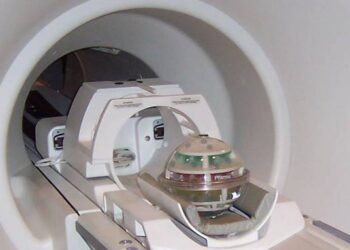Semaglutide improves obesity-related heart failure symptoms
1. In this randomized controlled trial, semaglutide was more effective in reducing heart failure-related symptoms and physical limitations in patients with obesity-related heart failure and type 2 diabetes mellitus (T2DM) than placebo.
2. Patients with obesity-related heart failure and T2DM exhibited greater weight loss with semaglutide than placebo.
Evidence Rating Level: 1 (Excellent)
Study Rundown: Heart failure with preserved ejection fraction (HFpEF) has been increasing in prevalence in the United States and is characterized by high symptom burden. The role of adiposity in HFpEF and T2DM is under investigation, and their concurrent presentation is associated with greater symptom burden and worse functional capacity. Semaglutide, a glucagon-like peptide-1 receptor agonist, has been effective in inducing weight loss in obese individuals and reducing major adverse cardiovascular events in high-risk patients. A previous study demonstrated that semaglutide effectively reduced heart failure-related symptoms and reduced weight loss in patients with HFpEF and obesity. However, patients with obesity-related heart failure and T2DM may respond differently to semaglutide given that these patients often present with a more advanced phenotype and patients with T2DM have exhibited less weight loss in trials of anti-obesity pharmacotherapy compared to those without T2DM. Thus, this trial investigated the efficacy of semaglutide in patients with obesity-related HFpEF and T2DM. It demonstrated that semaglutide was more effective in reducing heart failure-related symptoms and physical limitations in such patients than placebo. It also showed that these patients exhibited greater weight loss with semaglutide. Moreover, the incidence of serious adverse events was lower with semaglutide than placebo. The generalizability of the study findings is limited by the low number of non-White participants enrolled in the trial. The results regarding the efficacy of semaglutide also do not apply to the acute management of heart failure.
Click to read the study in NEJM
Relevant Reading: Semaglutide in patients with heart failure with preserved ejection fraction and obesity
In-Depth [randomized controlled trial]: STEP-HFpEF DM (Semaglutide Treatment Effect in People with Obesity and Heart Failure with Preserved Ejection Fraction and Diabetes Mellitus) is a double-blind, randomized controlled trial that investigated the efficacy and safety of semaglutide in patients with obesity-related HFpEF and T2DM. Enrolled patients were at least 18 years of age and had a diagnosis of T2DM, documented heart failure with an ejection fraction of at least 45%, and a body-mass index (BMI) of at least 30. Participants were randomly assigned in a 1:1 ratio to receive once-weekly semaglutide injections or placebo for 52 weeks. The primary endpoints were the change in the Kansas City Cardiomyopathy Questionnaire clinical summary score (KCCQ-CSS), which quantified heart failure-related symptoms and physical function on a scale from 0 to 100, and the percentage change in weight from baseline to week 52. Of 616 enrolled participants, 310 received semaglutide, and 306 received placebo. The median age of the participants was 69 years, and the median BMI was 36.9. The mean change in the KCCQ-CSS at week 52 was 13.7 points in the semaglutide group and 6.4 points in the placebo group (estimated difference, 7.3 points; 95% Confidence Interval [CI], 4.1 to 10.4; P<0.001). The mean percentage change in body weight was -9.8% with semaglutide and -3.4% with placebo (estimated difference, -6.4 percentage points; 95% CI, -7.6 to -5.2; P<0.001). Serious adverse events were reported in 55 participants (17.7%) and 88 participants (28.8%) in the semaglutide and placebo groups respectively. In summary, this trial demonstrated that semaglutide was more effective in reducing heart-failure related symptoms and physical limitations and inducing greater weight loss than placebo at 52 weeks in patients with obesity-related heart failure and T2DM.
Image: PD
©2024 2 Minute Medicine, Inc. All rights reserved. No works may be reproduced without expressed written consent from 2 Minute Medicine, Inc. Inquire about licensing here. No article should be construed as medical advice and is not intended as such by the authors or by 2 Minute Medicine, Inc.









